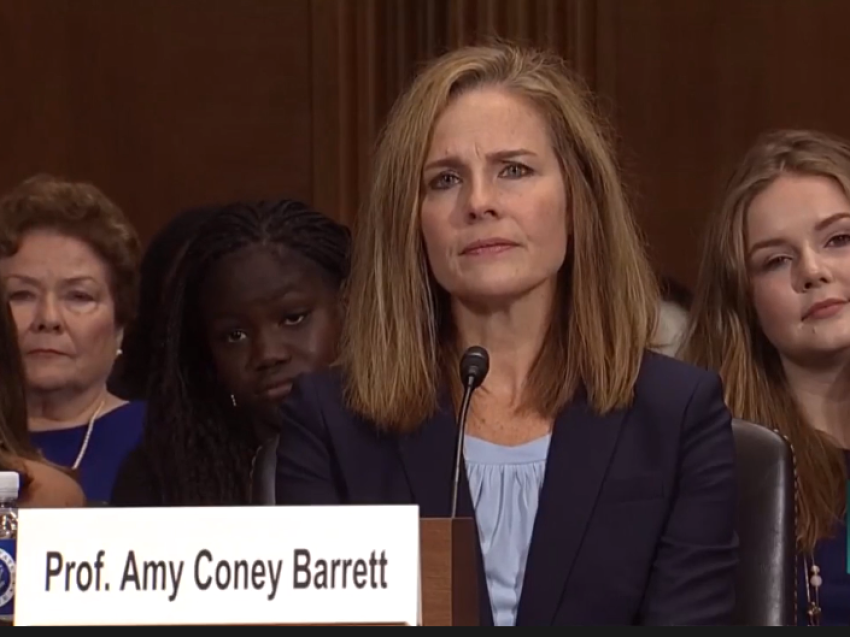Senate Confirms Notre Dame Prof, 'Catholic Pentecostal' Mom of 7, to Serve as 7th Circuit Court Judge

Amy Coney Barrett, a devout "Catholic Pentecostal" mother of seven who teaches and researches at the University of Notre Dame Law School was confirmed by the U.S. Senate on Monday to serve as a judge for the 7th Circuit Court of Appeals in Chicago, despite concerns raised by some lawmakers about her devotion to her faith.
Barrett, 45, whose teaching and research focus on the areas of federal courts, constitutional law, and statutory interpretation, was reported by The New York Times as being a member of a closely knit charismatic and ecumenical Christian group called People of Praise in South Bend, Indiana.
The group is "part of a global movement that has brought powerful new experiences of the Holy Spirit to more than 500 million people since the beginning of the 20th century," their website says.
"This historic revival is known as the Pentecostal movement or the charismatic renewal. Our particular moment in this larger story began in the late 1960s, when students and faculty at the University of Notre Dame began to experience a renewal of Christian enthusiasm and fervor, together with charismatic gifts such as speaking in tongues and physical healing, as described in the New Testament book of Acts," the group explains.
At a Senate hearing in September in a discussion over whether Barrett's Roman Catholic faith would influence her decisions on the bench, Sen. Dianne Feinstein, D-Calif., told the mother of seven that "the dogma lives loudly within you."
"When you read your speeches, the conclusion one draws is that the dogma lives loudly within you, and that's of concern when you come to big issues that large numbers of people have fought for, for years in this country," Feinstein said.
Progressives also raised concern, says The New York Times, because the 7th Circuit post is just one rung below the Supreme Court. Barrett is often mentioned as a potential candidate for the high court, if Justice Ruth Bader Ginsburg were to retire.
Feinstein's line of questioning prompted reactions from conservatives however, that a religious test was being used to determine Barrett's fitness for public office.
And prior to Barrett's confirmation by the Senate on Monday, Becket, a non-profit religious liberty law firm, joined several U.S. Senators and advocacy groups in speaking out against the dangers of unconstitutional religious tests that exclude people from serving as judges or other federal officials because of their religious beliefs.
"The Constitution forbids the government from imposing religious tests. Under our Constitution we are all free to serve and be evaluated on our own individual merits rather than on our religious beliefs. That rule goes for Catholics, and for Jews and for atheists, and for Muslims and for everyone else. Professor Barrett happens to be Catholic but the principle is much much broader," Becket Senior Counsel Mark Rienzi said at the press conference.
"It's not just wrong to use Professor Barrett's religious beliefs as a means to disqualify her — it's unconstitutional. There is a long, ugly history of using religious tests to exclude Catholics, Presbyterians, Quakers, Methodists, Jews, Muslims, and atheists from public office. We shouldn't repeat it," he added.
Legal scholars argued in The New York Times report however that Barrett's involvement with People of Praise could affect her independence and impartiality
Members make a covenant to one another, and are assigned and are accountable to a personal adviser, called a "head" for men and a "handmaid" for women, The New York Times says.
Heads and handmaids give direction on important decisions, such as whom to date or marry, where to live, whether to take a job or buy a home, and how to raise children, current and former members say.
Sarah Barringer Gordon, a professor of constitutional law and history at the University of Pennsylvania said: "These groups can become so absorbing that it's difficult for a person to retain individual judgment. I don't think it's discriminatory or hostile to religion to want to learn more (about her relationship with the group)."
Craig S. Lent, a leader with People of Praise who has been with the group for nearly 40 years, told The New York Times that the group doesn't try to control people.
"We don't try to control people," Lent, who is also a professor of electrical engineering and physics at Notre Dame said. "And there's never any guarantee that the leader is always right. You have to discern and act in the Lord."
He continued: "If and when members hold political offices, or judicial offices, or administrative offices, we would certainly not tell them how to discharge their responsibilities."



























